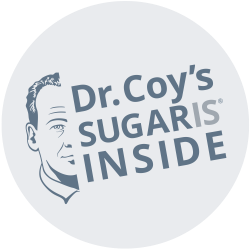From an evolutionary perspective, the human brain surpassed other animals with the development of complex thought processes. We upgraded our intellectual abilities while developing social and behavioral constructs that override animal instincts. But these higher cognitive functions require a lot of energy, and when we are under stress, we still return to more primitive fear-driven responses.
Our modern environment bombards us with information, demands our attention, and presents many challenges. Our ability to filter, focus and retain information is critical for our psychological wellbeing. But more and more people are struggling to fuel these higher cognitive functions.
Anxiety, depression, forgetfulness, and mental decline are becoming more pronounced as the combination of inflammation and oxidative stress is impairing our ability to think clearly.
Fortunately, galactose can be used to help fuel the mind and repower our memory.
Mental Power
Your brain is power-hungry, it needs more energy than any other organ in the body; it uses 20% of your entire energy supply every day. Although the brain can use fat for fuel, in the form of ketone bodies, it is largely dependent on simple sugars. Critical thinking, memory, and comprehension are closely linked to how well the brain can access and utilize fuel.
If there isn’t enough energy, the brain is unable to produce sufficient chemical messengers, called neurotransmitters, and communication breaks down. Many people experience this as ‘brain fog’ when you can’t clearly think through the steps needed to complete tasks, or why you walked into a specific room.
When energy levels drop, known as hypoglycemia, it reduces brain function and is linked to poor attention, irritation and anxiety. Often accompanied with tiredness this drop in energy supply is becoming more common due to insulin resistance.
Our Sweet Excess
Glucose is a simple sugar which fuels the brain and body, and without a constant supply the brain would starve. But an excess of glucose is equally dangerous; it can create chaos for the blood and proteins in the body. To prevent the build-up of too much glucose the body relies on insulin to balance energy demands with supply.
The hormone insulin acts like a gate keeper, tightly regulating how much sugar is allowed into cells. When there is too much glucose in the blood, the response to insulin is ‘turned down’. Medically this re-calibration is known as insulin resistance, but this over-simplifies the active biological control being carried out. The body is not ‘resistant’ to one of its critical messenger hormones, it has ‘decided’ that the danger of excess glucose needs to be prevented at all costs.
When there is too much glucose in the body it causes premature aging, cellular damage, and inflammation. Glucose literally sticks to proteins forming Advanced Glycation End-products (AGE’s) which impairs their function:
- When glucose sticks to red blood cells it reduces their ability to transport oxygen.
- It also reduces skin elasticity, causing the skin to wrinkle and age prematurely.
Brain Body Balance
Our dietary excess, specifically added sugars in processed food, means that 40% of adults are now pre-diabetic. This means the dangers of too much glucose are so severe that the body has decided to re-regulate insulin to prevent cell damage. The body’s choice to become resistant to insulin is necessary for survival, but it leaves the brain lacking in fuel.
The lack of mental capacity, poor memory and confusion associated with neurodegenerative conditions like Alzheimer’s and Dementia are strongly correlated to impaired energy uptake, and insulin resistance.
Fortunately, this is where galactose can step in. Galactose is able to fuel brain cells without insulin. This means that the brain can access all the energy it needs while the body protects itself from the dangers of excess glucose.
Galactose’s ability to fuel the brain has been successfully shown in animal studies. Blocking insulin receptors in rats causes the development of dementia like symptoms. But, after supplementing with galactose the rats regained their cognitive capacity and memory.
Supporting Dementia
Galactose has been shown to improve memory, and combat symptoms, during the early stages of dementia. Because galactose can be directly transported to the brain, it makes it an immediate and effective fuel source.
Infants depend on this sugar for their growth and development, which is why it is found in high concentrations in breast milk. It is also found in dairy products, like yogurt and kefir, but since it is such a small amount, it is difficult to benefit from galactose in this form.
Pure galactose, however, can help enhance memory and counteract dementia symptoms like confusion.
Type 3 Diabetes
Alzheimer’s Disease is becoming known as a 3rd type of diabetes. Its association with impaired sugar metabolism is so strong that the conditions are intricately connected. More than just a risk factor, pre-diabetes and diabetes, with their associated insulin resistance, could be the cause of the mental decline.
Researchers found a correlation between increased insulin and inflammatory activity. Problematic protein deposits in the brain, specifically the Abeta peptide, associated with Alzheimer’s appear to be strongly associated with insulin levels. Experiments in healthy volunteers clearly demonstrated that increasing insulin levels resulted in more inflammation and Abeta peptides in the fluid surrounding the brain and spine.
Even a relatively small increase in insulin levels, due to excess dietary glucose, seems to dramatically increase inflammation and heighten the risk of developing Alzheimer’s.
What’s Great About Galactose?
Research into galactose is rapidly revealing that it provides more than just a steady supply of energy. Galactose has multiple roles in supporting cognitive function and preventing age-related memory decline. At a cellular level galactose contributes to brain health by enhancing the production of galactocerebroside, which is a key component of myelin, which helps protect nerve cells.
Myelin insulates nerves, much like the plastic casing around electrical wires. This ensures efficient and effective communication between brain cells, which is essential for learning, memory, and thinking clearly. Age-related neurodegenerative conditions are often accompanied by a decline in myelin integrity, leading to cognitive decline, confusion and memory problems.
Adding galactose to your diet can help safely fuel the brain, even in the presence of insulin resistance.
Dr Johannes Coy, found of Intelligent Sugar, has studied galactose and a range of natural healthy sugars. He developed a unique blend of natural sugars to provide sustained energy without damaging the body. These sugars, including galactose, are metabolized differently, avoiding the inflammatory blood-sugar ‘rollercoaster’ that causes anxiety, fatigue, and hunger.
Learn more about galactose and how to use it to sweeten your favourite hot drinks and desserts.
Resources
https://www.cdc.gov/diabetes/data/statistics-report/prevalence-of-prediabetes.html
Crane PK, Walker R, Hubbard RA, Li G, Nathan DM, Zheng H, Haneuse S, Craft S, Montine TJ, Kahn SE, McCormick W, McCurry SM, Bowen JD, Larson EB. Glucose levels and risk of dementia. N Engl J Med. 2013 Aug 8
Kerti L, Witte AV, Winkler A, Grittner U, Rujescu D, Flöel A. Higher glucose levels associated with lower memory and reduced hippocampal microstructure. Neurology. 2013 Nov 12
Wium-Andersen IK, Rungby J, Jørgensen MB, Sandbæk A, Osler M, Wium-Andersen MK. Risk of dementia and cognitive dysfunction in individuals with diabetes or elevated blood glucose. Epidemiol Psychiatr Sci. 2019 Aug 28;
Willette AA, Johnson SC, Birdsill AC, Sager MA, Christian B, Baker LD, Craft S, Oh J, Statz E, Hermann BP, Jonaitis EM, Koscik RL, La Rue A, Asthana S, Bendlin BB. Insulin resistance predicts brain amyloid deposition in late middle-aged adults. Alzheimers Dement. 2015 May
Tanya Jain, Yue-Ming Li ,Gut microbes modulate neurodegeneration.Science379,142-143(2023)
Chiroma SM, Baharuldin MTH, Mat Taib CN, Amom Z, Jagadeesan S, Ilham Adenan M, Mahdi O, Moklas MAM. Centella asiatica Protects d-Galactose/AlCl3 Mediated Alzheimer’s Disease-Like Rats via PP2A/GSK-3β Signaling Pathway in Their Hippocampus. Int J Mol Sci. 2019 Apr 16
Roser M, Josic D, Kontou M, Mosetter K, Maurer P, Reutter W. Metabolism of galactose in the brain and liver of rats and its conversion into glutamate and other amino acids. J Neural Transm (Vienna). 2009 Feb


